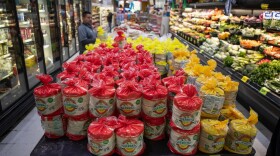ROBERT SIEGEL, host:
From NPR News, this is ALL THINGS CONSIDERED. I'm Robert Siegel.
MELISSA BLOCK, host:
And I'm Melissa Block.
Kurdistan in northern Iraq is the safest, most prosperous part of the country. The region is, in many respects, autonomous and the Kurdish authorities have managed to protect their territory from the violence that is tearing apart much of the rest of Iraq. But internal problems are growing.
NPR's Ivan Watson reports from the town of Halabja, where many young Iraqi Kurds want to leave.
IVAN WATSON: There isn't much to do for young men in Iraqi Kurdistan on the weekend.
(Soundbite of kids)
WATSON: These young Kurds in their teens and twenties play soccer on a garbage-strewn dirt field that's wedged in between several gray cinderblock houses. The players are consumed by the game, ignoring the cow that's grazing behind one goal and the call to prayer that echoes from mosques around town.
(Soundbite of chanting)
WATSON: Ask these young Kurds about their plans for the future and they all say the same thing.
(Soundbite of crowd)
Unidentified Man: We all have plans that as soon as summer comes, we will leave this country. Even in the summer, because we are very disappointed in this country.
WATSON: Across Iraqi Kurdistan, the complaints from young Kurds are almost all the same - no jobs, rampant corruption, lack of political freedom and lack of electricity. It's a surprise to hear this coming from Kurdish men who just three years ago danced patriotically in the streets waving the flag of Kurdistan as they celebrated the overthrow of Saddam Hussein.
Now an entire generation of depressed male Kurds is talking about sneaking into Europe to find jobs. Many have already left.
Mr. ROBOIRE ADHAM (Kurdish Émigré): (Speaking foreign language)
Unidentified Man #2: (Speaking foreign language)
WATSON: In a reading room in Halabja, members of the Adham(ph) family talk over speaker phone with their 24-year-old son Roboire(ph), who smuggled himself to Greece last September. There he now earns $1000 a month working in an Athens restaurant.
Mr. R. ADHAM: (Speaking foreign language)
Unidentified Man #2: (Speaking foreign language)
WATSON: Roboire says he left because he saw no future in Kurdistan aside from getting a job as a poorly paid teacher in a remote village. He tried to sneak across the border to Turkey twice, but only succeeded on the third try after paying $5000 to smugglers who took him on a long and dangerous trip that involved spending 48 hours hiding in the back of a truck.
Roboire's mother, Bahar(ph), says she initially opposed her son's departure, but she's since changed her mind.
Ms. BAHAR ADHAM (Mother): (Speaking foreign language)
WATSON: The Kurds spent so long struggling for freedom from Saddam, she says, but in reality, our leaders were just struggling for themselves so that they could steal the money of the people. That, Bahar adds, is why all the young men are leaving this country.
(Soundbite of music)
WATSON: The Adhams are considered a middle class family in Kurdistan, but they spend their afternoon huddled in one room around a kerosene heater, listening to a battery-powered radio because there are only two hours of electricity a day in Kurdistan and fuel costs too much to heat the rest of the house.
Roboire's 26-year-old brother Netchuwan(ph) says he can't wait to join his brother in Europe.
Mr. NETCHUWAN ADHAM (Brother): (Through translator) Europe is paradise.
Mr. FOUAD HUSSEIN (Kurdistan regional official): For the longest time, we could not understand it, because we spent all of our life in the struggle.
WATSON: Fouad Hussein is a top official in the Kurdistan regional government and a veteran of the Kurds' long struggle against the central government in Baghdad. Now that Iraqi Kurdistan has finally achieved real autonomy, Hussein says he doesn't understand why so many young men are fleeing the country, especially at a time when the region is importing foreign labor.
Mr. HUSSEIN: We have got now workers from India. Workers from Ethiopia. Workers from Philippines. Arabs. Turks. From all over the world. Why our youth leaving to other countries?
WATSON: Part of the problem, young Kurds say, is that without government connections their future employment opportunities are limited to working either as poorly paid laborers or as functionaries in the bloated government bureaucracy. But the older former freedom fighters now in government appear unwilling to share power with a new generation. Kurdish security forces have repeatedly used lethal force to crush opposition protest in towns like Halabja.
That's left 26-year-old Ardalon Mohammad(ph) and his friend Govan Mohammad(ph) disillusioned, bitter and bored. They sit at sunset on a hillside orchard in Halabja watching their friends get drunk around a campfire.
Unidentified Man #3: (Speaking foreign language)
WATSON: This place is like a prison and our leaders are barbarians, the young men say. This summer, they vow to smuggle themselves to Europe or die trying.
Ivan Watson, NPR News. Halabja, Iraqi Kurdistan. Transcript provided by NPR, Copyright NPR.






